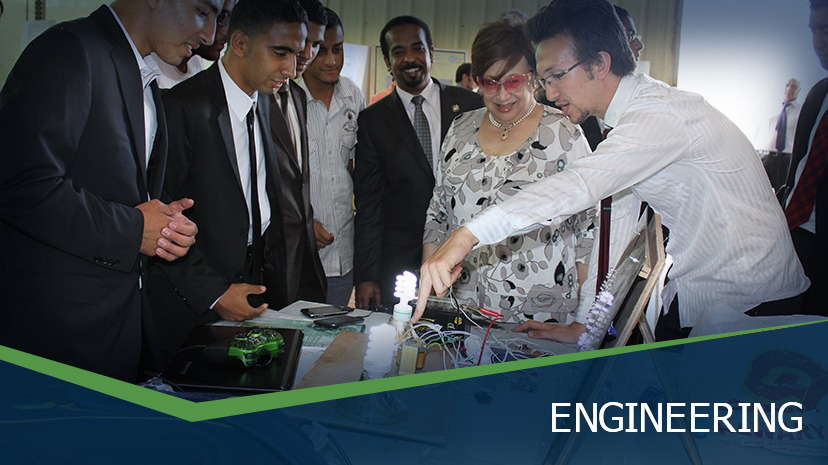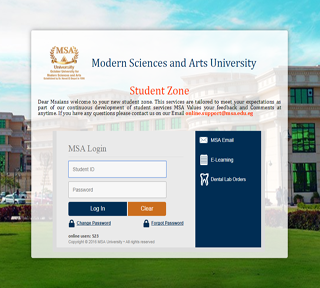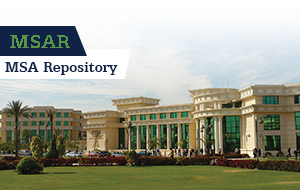Admission Requirements for Faculty of Engineering

* Other foreign certificates including certificates from Arab countries are evaluated at the Admission Office in accordance to the regulations set by the Egyptian Ministry of Higher Education.
FACULTY OF ENGINEERING DEPARTMENTS
The Faculty of Engineering consists of the following seven scientific departments:
1. General Systems Engineering (GSE) Department:
The following subject areas are assigned for teaching and carrying out relevant research work: Engineering Mathematics, Engineering Physics, Modern Physics, Engineering Chemistry, Engineering Mechanics, Engineering Graphics, Workshop, and Introduction to information technology.
2. Architectural Systems Engineering (ASE) Department:
The following subject areas are assigned for teaching and carrying out relevant research work: Architectural Design, Architecture History & Theories, Architecture Graphics, Architecture Computer Graphics, Building Construction, Working Drawings, Urban Planning & Design, Landscape Design, Interior Design, Environmental Control Systems, Technical Service Systems, Construction Management, Professional Practices & Building Regulations, Housing Planning & Design, Engineering Surveying, Properties & Strength of Materials, Structural Analysis, Reinforced Concrete Structures, Steel Structures.
3. Civil Engineering Systems (CES) Department:
The following subject areas are assigned for teaching and carrying out relevant research work: Properties of Materials, Engineering Surveying, Structural Analysis, Soil mechanics, Design of Foundations, Concrete Structures Design, Steel Structures Design, Modern building materials, Precast and Prefabricated Structures, Design of Prestressed Concrete and Bridges, Repair and Rehabilitation of Structures, Water and Wastewater Engineering, Fluid Mechanics, Civil Engineering Drawings, Highway Engineering, Computer Applications in Civil Engineering, Architecture Design and Building Construction, Mechanical and Electrical Systems, Project management, Building Information Modeling (BIM), Quality Control Management, Project Bids and Contracts.
4. Computer Systems Engineering (CSE) Department:
The following subject areas are assigned for reaching and carrying out relevant research work: Artificial intelligence, machine learning, Internet of things (IoT), Cloud computing, Mobile communication, computer security, fundamentals of database systems, computer architecture and microprocessors, energy conversion, VLSI design, Object oriented programming and data structures and some other specific elective courses in recent hot technological topics like big data analytics and digital transformation.
5. Electrical Communications & Electronic Systems Engineering (ECE):
The following subject areas are assigned for teaching and carrying out relevant research work: Electric Circuit Analysis, Physics of Electrical Materials, Solid State Devices, Digital Logic Design, Electronic Circuit Analysis, Electromagnetic, Linear Systems, Electrical Measurement Instruments, Data Communication, Automatic Control Systems, Communication Systems, Microwave Engineering, Information Theory & Coding, Energy Conversion, Digital Systems Interfacing, Antenna Theory & Design, VLSI Design, Fiber Optics and Laser Technology, and Microwave.
6. Industrial Systems Engineering (ISE) Department:
The following subject areas are assigned for teaching and carrying out relevant research work: Workshop Technology, Engineering Materials, Engineering Measurements, Thermodynamics & Heat Transfer, Fluid Mechanics, Electricity, Electronics, Stress Analysis, Machine Design, Tool Design, Product Development & Design, Traditional & Advanced Manufacturing Processes, CNC Machines & CAD/CAM, Engineering Economic Analysis, Operations Research, Work Analysis & Measurements, Facilities Planning & Design, Statistical Quality Control, Quality Management & Assurance, Production Planning & Control, Maintenance Planning & Control, Lean Six-Sigma Manufacturing Systems, Project management Systems, Simulation Modeling and Analysis, Robotics & Automatic Control Systems, and Design of Experiments.
7. Mechatronics Systems Engineering (MSE) Department:
The following subject areas are assigned for teaching and carrying out relevant research work: Engineering Materials, Computer Programming, Thermodynamics, Electric Circuits, Stress Analysis, Machine Elements Design and Drawing, Electronic Circuits, Manufacturing Processes, Fluid Mechanics, Numerical Analysis, Sensors and Data Acquisition System, Machine Design, Heat Transfer, Electric Drive Systems, Digital Logic Control, Numerical Control Machines and CAD/CAM, Vibration, Mechatronics Modelling and Simulation, Hydraulic and Pneumatic Control, Automatic Control, Robotics, Industrial Automation, Artificial Intelligence, Microprocessors and Microcontrollers, Mechatronics System Design, Troubleshooting of Mechatronics System, Embedded Computer Systems, Digital Signal Processing, Noise and Acoustic Control, Renewable Energies, and Computer Communication Networks.

















